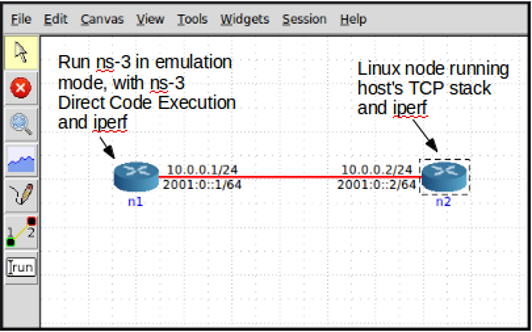HOWTO use CORE to test ns-3 TCP
Main Page - Roadmap - Summer Projects - Project Ideas - Developer FAQ - Tools - Related Projects
HOWTOs - Installation - Troubleshooting - User FAQ - Samples - Models - Education - Contributed Code - Papers
This is a use case for the parent page of HOWTO Use CORE to test ns-3 protocols
Use case summary
We want to test the operation of ns-3's TCP with the TCP of other operating systems, for correctness and interoperability. We want the ns-3 TCP to operate as a client and a server (in different test runs).
A key consideration is what will be the application that will drive the TCP. Note that if there are any application-level semantics in the bit stream being exchanged, whatever is sitting on top of ns-3's TCP must be able to interoperate with whatever is sitting on top of the real node's TCP.
Iperf is a popular testing tool, but it has exactly these types of application-level semantics-- iperf will not interoperate with an ns-3 application. Fortunately, the ns-3 Direct Code Execution mode supports iperf, so we will describe that herein.
Another alternative (not written up here) would be to use Stevens's sock program as the real node's application, and either BulkSendApplication or PacketSink as the ns-3 application.
Prerequisites
We are aiming for the following configuration, where CORE can be used to add delay and packet errors.
First, download bake as described in the bake quick-start guide:
$ hg clone http://code.nsnam.org/bake destination directory: bake requesting all changes adding changesets adding manifests adding file changes added 323 changesets with 779 changes to 63 files updating to branch default 45 files updated, 0 files merged, 0 files removed, 0 files unresolved $ export BAKE_HOME=`pwd` $ export PATH=$PATH:$BAKE_HOME $ export PYTHONPATH=$PYTHONPATH:$BAKE_HOME $ mkdir dce $ cd dce $ bake.py configure -e dce-ns3-1.3 $ bake.py download && bake.py build >> Searching for system dependency libpcap-dev - OK >> Searching for system dependency libexpat-dev - OK >> Downloading iperf - OK >> Downloading wget - OK >> Downloading thttpd - OK >> Searching for system dependency python-dev - OK >> Searching for system dependency pygraphviz - OK >> Searching for system dependency pygoocanvas - OK >> Downloading pybindgen-0.17.0.868 - OK >> Searching for system dependency g++ - OK >> Searching for system dependency libc-debug - Problem > Problem: Optional dependency, module "libc-debug" not available This may reduce the functionality of the final build. However, bake will continue since "libc-debug" is not an essential dependency. For more information call bake with -v or -vvv, for full verbose mode. >> Searching for system dependency qt4 - OK >> Downloading ccnx - OK >> Downloading elf-loader - OK >> Downloading netanim-3.105 - OK >> Downloading ns-3.20 - OK >> Downloading dce-meta-1.3 (target directory:ns-3-dce) - OK >> Downloading dce-ns3-1.3 (target directory:ns-3-dce) - (Nothing to do, source directory already exists) - OK >> Building iperf - OK >> Building wget - OK >> Building thttpd - OK >> Building pybindgen-0.17.0.868 - OK >> Building ccnx - OK >> Building elf-loader - OK >> Building netanim-3.105 - OK >> Building ns-3.20 - OK >> Building dce-ns3-1.3 - OK
Now run the iperf example as shown in the quick start guide.
$ cd source/ns-3-dce/ $ ./waf --run dce-iperf Waf: Entering directory `/path/to/bake/dce/source/ns-3-dce/build' ... 'build' finished successfully (0.551s)
And look at the resulting stdout files:
$ cat files-1/var/log/*/stdout ------------------------------------------------------------ Server listening on TCP port 5001 TCP window size: 124 KByte (default) ------------------------------------------------------------ [ 4] local 10.1.1.2 port 5001 connected with 10.1.1.1 port 49153 [ ID] Interval Transfer Bandwidth [ 4] 0.0-11.2 sec 5.75 MBytes 4.31 Mbits/sec $ cat files-0/var/log/*/stdout ------------------------------------------------------------ Client connecting to 10.1.1.2, TCP port 5001 TCP window size: 124 KByte (default) ------------------------------------------------------------ [ 3] local 10.1.1.1 port 49153 connected with 10.1.1.2 port 5001 [ ID] Interval Transfer Bandwidth [ 3] 0.0- 1.0 sec 640 KBytes 5.24 Mbits/sec [ 3] 1.0- 2.0 sec 512 KBytes 4.19 Mbits/sec [ 3] 2.0- 3.0 sec 640 KBytes 5.24 Mbits/sec [ 3] 3.0- 4.0 sec 512 KBytes 4.19 Mbits/sec [ 3] 4.0- 5.0 sec 640 KBytes 5.24 Mbits/sec [ 3] 5.0- 6.0 sec 512 KBytes 4.19 Mbits/sec [ 3] 6.0- 7.0 sec 512 KBytes 4.19 Mbits/sec [ 3] 7.0- 8.0 sec 640 KBytes 5.24 Mbits/sec [ 3] 8.0- 9.0 sec 512 KBytes 4.19 Mbits/sec [ 3] 9.0-10.0 sec 640 KBytes 5.24 Mbits/sec [ 3] 0.0-10.2 sec 5.75 MBytes 4.73 Mbits/sec
This validates that DCE can run iperf between two ns-3 nodes. Next, we want to change the program to use ns-3 emulation mode.
